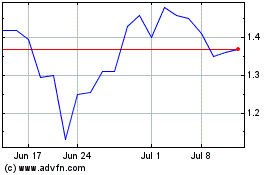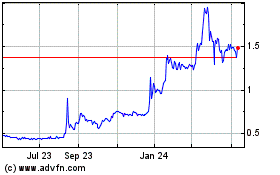Fannie Mae and Freddie Mac Agree to Terms on Resolving Mortgage Disputes
February 02 2016 - 4:50PM
Dow Jones News
Fannie Mae and Freddie Mac on Tuesday said they have come to
terms with lenders on how to resolve mortgage disputes, capping an
effort that regulators hope will make loans cheaper and easier to
get for risky borrowers.
The announcement marks the end of a four-year push by Fannie,
Freddie and their regulator, the Federal Housing Finance Agency, to
ease mortgage companies' fears of being slapped with penalties for
faulty loans, in a bid to encourage them to pick up lending to more
risky borrowers.
FHFA Director Mel Watt in a statement said the changes "will
increase clarity for lenders and will ultimately increase access to
mortgages for creditworthy borrowers."
Under the new rules announced Tuesday, lenders will have the
ability to appeal a mortgage-related penalty to an independent
arbiter, a step meant to speed up the resolution of disagreements
between regulators and lenders.
Fannie and Freddie don't make mortgages. They buy them from
lenders, wrap the loans into securities and provide guarantees to
make investors whole if the loans default.
When Fannie and Freddie determine a lender has made mistakes on
a mortgage or that it doesn't meet their requirements, the
companies have sometimes forced lenders to buy the loans back.
As billions in loans defaulted during the financial crisis,
Fannie and Freddie said many of the mortgages didn't meet their
requirements. That, combined with major lawsuits and federal
settlements, prompted some lenders to pull back from making some
mortgages to borrowers eligible for federal backing but who are
more prone to default.
Even with the changes to the dispute process, however, some
mortgage experts doubt that borrowers will see greatly expanded
mortgage access. Fannie and Freddie will back loans to borrowers
with a credit score of as low as 620, on a scale of 300 to 850.
Before the changes were implemented, some large banks hit with
the hardest penalties set higher credit score cutoffs or other
requirements that excluded riskier borrowers. Rather than limit
mortgage access, that instead shifted more business to smaller
nonbank lenders that didn't experience severe penalties after the
mortgage crisis, said Mark Calabria, director of financial
regulation studies for the Cato Institute, a libertarian think
tank.
Although it remains difficult for less-creditworthy borrowers to
get a mortgage, without the FHFA's effort, lenders might have
pulled back from the mortgage market even further, said Michael
Calhoun, president of the Center for Responsible Lending, which
advocates for broader loan access. Fannie and Freddie "need to do a
lot more, but it does remove what was a huge impediment and stops
further contraction," Mr. Calhoun said.
Some lenders have said that Fannie's and Freddie's changes have
led them to feel more comfortable lending to riskier borrowers.
Bill Emerson, CEO of Quicken Loans Inc., said the nonbank lender
now will make any loan that Fannie and Freddie will accept. Mr.
Emerson said Quicken never had severe restrictions on mortgages
backed by the companies but that could have changed without the
FHFA's moves of the last couple of years.
Franklin Codel, head of home lending for Wells Fargo & Co.,
said in an email that the change "brings greater certainty and
strengthens the home lending system."
The process of allaying lenders' concerns on penalties and
broadening mortgage access began in 2012 but has ramped up since
Mr. Watt took the helm of the FHFA in 2014.
In 2013, the agency said lenders wouldn't face buybacks as long
as the borrower didn't miss a payment for three years except in
cases of fraud, and later said that borrowers could miss up to two,
nonconsecutive payments.
In 2014, the agency reached an agreement with lenders on what
would constitute fraud. Last year, the FHFA defined the severity
and associated costs for various mistakes, opening the possibility
for lenders to receive a less onerous penalty for smaller
problems.
Now, under Tuesday's agreement, Fannie, Freddie and lenders will
go to an independent arbiter in cases where they still disagree on
whether a mortgage had a mistake. That takes some power away from
Fannie and Freddie, which previously were the final deciders unless
a lender tried to take the companies to court.
Write to Joe Light at joe.light@wsj.com
(END) Dow Jones Newswires
February 02, 2016 16:35 ET (21:35 GMT)
Copyright (c) 2016 Dow Jones & Company, Inc.
Fannie Mae (QB) (USOTC:FNMA)
Historical Stock Chart
From Mar 2024 to Apr 2024

Fannie Mae (QB) (USOTC:FNMA)
Historical Stock Chart
From Apr 2023 to Apr 2024
